I know firsthand how easy it is to worry endlessly about how much and which foods our kids are eating. Feeding toddlers can be SO hard, and confusing, and frustrating. But there’s merit in trying to squelch the obsessing over each bite. Here’s why you may want to try to stop obsessing about your toddler’s appetite—and how to actually do it!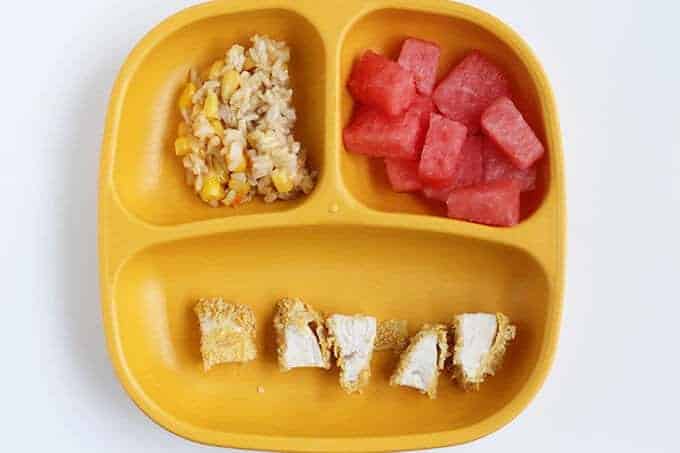
Toddler Appetites
There was a weekend when my oldest was two that we spent some time with my two best friends and their toddlers. It was a really fun weekend away and I love that our daughters had the chance to get to play together. One thing that I couldn’t help but notice was how different the girls appetites were, especially the two that are closer in age.
Both are healthy, both are energetic, yet their eating styles were pretty different. Among the three girls, mine had the biggest appetite and to be completely honest, it made me a little nervous and self conscious. Was she eating too much? And: Had I done something wrong?
A few days later we were back home and out to dinner with my husband. The waitress commented more than once about how L was a “good eater” because of how enthusiastically she was eating her edamame and shrimp. The girl loves Japanese food!
The next day, after a morning at a waterpark, L didn’t eat anything for dinner. She was suddenly really, really sick and hardly ate a thing for the next four days. I’m talking ½ a slice of bread and five Cheerios for an entire day. Did that make her a “bad” eater?
What’s normal for a toddler’s appetite?
In just under a week, I went from having the kid with the biggest appetite to a kid who was hardly eating. I was offering all of her favorite foods and still, no dice. And sure, sickness was at play, but the huge swing really made me think about my own relationship with my daughter’s appetite. Why was I so preoccupied by it? To help my thought process, I consulted feeding expert Ellyn Slatter. Look at what I found (emphasis is mine):
The average toddler eats from 960 to 1700 calories a day. Add on to that a normal 20% over and under day-to-day variation, and that child will eat between 760 to 2040 calories a day. Children of other ages show the same variation. If you are restricting how much your child eats or pressuring her to eat, her day-to-day variation will be even greater. Your child will eat less or more depending on who has the upper hand.
I was considered “chubby” as a kid and it definitely influenced how food was handled in my house. It look me a long (loooong) time to overcome the feelings of shame and guilt I learned from a young age to associate with food and I don’t want that cycle to start in my daughter—or in anyone else’s kids.
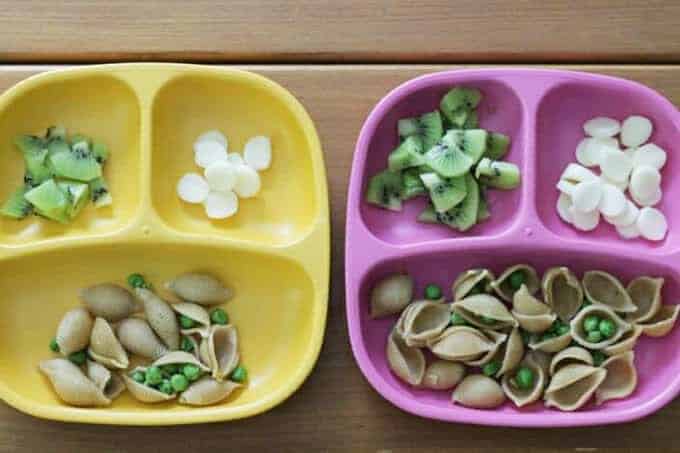 Feeding Your Toddler: Here’s What to Know
Feeding Your Toddler: Here’s What to Know
Toddler appetites vary.
Their intake can be so varied and variable that it’s pretty hard to accurately define when a little one is eating enough—or too much. It’s simply impossible to objectively decide what’s the right amount.
Kids instinctively know how much to eat.
This is true for little kids under the age of 3 (about), even when they are sick. (We adults do too, but I think that it’s all wrapped up in emotions and our personal histories with food so it’s harder for us to tell…) They might need to be reminded that there’s a drink nearby, or that it’s snack time, but when my girl was dealing with a high spiking fever, she drank way more liquids than she normally does. Her body was using its resources to fight off the virus and needed the liquids more than solid foods.
How we view what our kid’s eat is tied to how we view what WE eat.
Whether or not we view how much they are eating as too little, too much, or just enough is likely wrapped up in how we ourselves feel about food on any given day. Are we comfortable with our own intake? Are we able to listen to our hunger and satiety cues? Do we feel comfortable in our bodies? Do we trust ourselves?
It’s our job to help them trust their own hunger.
If we push them to eat more (or less) than they naturally want to, they won’t know how to trust their own hunger cues and signals. I know that when my food was restricted as a kid, I rebelled by hiding food, eating in secret, and lying about what I was eating. No one wants that! Instead, using the framework of the Division of Responsibility can set the whole family up for happier mealtimes.
We can set them up for success.
By surrounding our kids with healthful food most of the time, and letting them decide what and how much to eat, we give them the chance to learn the skills of self regulation. These are the same skills that we adults often have to dig deep to find if we weren’t given the opportunity to practice them when we were kids.
The Problem with “Good” vs “Bad” Foods
The more we talk about food negatively—whether calling something “bad”, talking about how something we eat will make us fat, or how we aren’t eating one thing or another for whatever reason/detox/diet we happen to be on—the more our kids will grow up learning that food makes us feel badly about ourselves. Or that it makes us question our value as a person. And that it can totally define our moods during the course of a day.
TIP: Read more about “good” vs “bad” foods here.
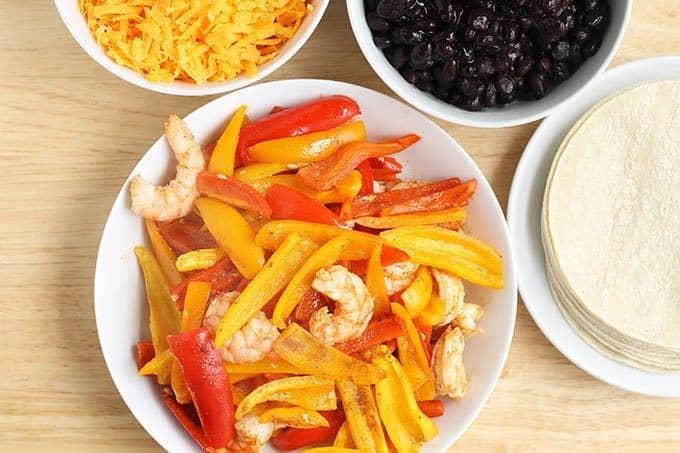 How to Trust Your Toddler’s Appetite
How to Trust Your Toddler’s Appetite
Here are a few ways to trust that your toddler is eating enough, assuming there are no serious health conditions.
- Serve food family-style.
Then let the kids decide what from the foods you’ve served they want to eat and how much. Keep any commentary to yourself, though feel free to talk about what’s on the table in a neutral way. - Don’t force them to eat if they aren’t hungry.
This can happen on any random day, so if your toddler isn’t hungry, let it be okay that they aren’t as hungry as you expect. They are the only ones in their bodies who can actually know how their belly feels. - Consider if “pickiness” is actually a kid clearly showing you that they aren’t hungry.
One of the most liberating perspectives to take is to assume that if your child won’t eat the food you’ve made, then they aren’t hungry—NOT that they are picky. This is such a help in learning to trust their hunger. - Set a clear routine.
Mealtimes, snack times, and food-free times in between can help kids regulate their hunger and eat at appropriate times. If your child wants to snack all day, try working on a set feeding schedule and doing other things when mealtime is done. - Set boundaries.
The best way to avoid becoming a short-order cook or becoming confused about your child’s hunger is to make a meal, let them eat it (or not!) and call it good until the next meal. The more we get up and get our kids other things to eat, the more confusing it is for everyone to know how hungry they are and what they truly like—and it’s seriously too much work! - Expect intake to go down during sickness.
The most important thing when a kiddo is sick is fluids and many often don’t eat much at all. Lower your expectations! - Expect intake to fluctuate from meal to meal or week to week.
Some kids eat a big breakfast and taper down, eating hardly anything for dinner. Others may not ever be hungry for breakfast but are ravenous by 10 am. It’s okay if your child has their own hunger pattern—and it’s okay if that varies.
How to Raise a Healthy Eater
To me, raising a healthy eater—and not necessarily a kid who eats three bites of broccoli today—is my big picture goal. And in order to make that happen, it can really help to take a step back and realize that we might be making things worse with our own expectations. Try to relax and avoid mealtime pressure and let your child show you how much they need to eat. It can really make meals so much happier!
Because: If we don’t trust our toddlers to eat the right amount for their bodies, they never will.
This post is not meant to be a substitute for medical advice. Please consult your pediatrician or a feeding therapist as needed.
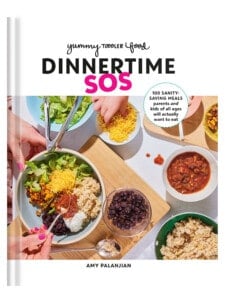
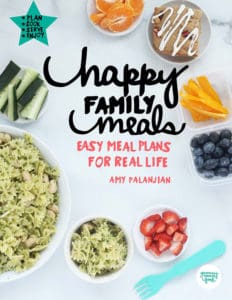
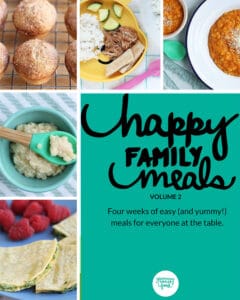
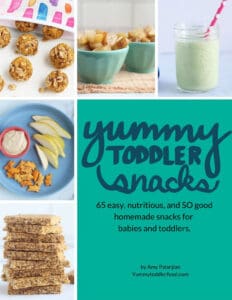















When should I really seek professional help, and who would I even go to? My 19 month old is way beyond picky and it only gets worse. I started BLW at 6 months so excited to make sure he had 100 new foods before he was one, and expected him to love veggies and all foods like I do. He learned early on to feed himself, but he will only eat a very tiny list of foods and drops things often. Zero vegetables, unless I hide spinach in a smoothie. He recently also dropped oatmeal and eggs so basically he eats bread, cottage cheese and berries. I’m not exaggerating unfortunately. His pediatrician is no help bc Jonah is a healthy weight mostly thanks to the fact that he still nurses 3 x a day. I’m so discouraged and worried about his little brain no getting the micronutrients it so desperately needs. Jonah is hitting milestones, and loves to be read too, however he still isn’t talking at all, just constantly babbling words we don’t understand. I am sitting here now already stressed about snack and dinner since he refused lunch. I need help.
I think since you are saying that you need help, the time to seek professional help is now. Here are some options: The Feeding Littles toddler course is something that might offer you more insight into this specific age. Or, one on one I recommend Thrive by Spectrum (great with kiddos who aren’t eating much or a variety) https://thrivewithspectrum.com/ or Lutz & Alexander Nutrition Therapy (also really great) https://lutzandalexander.com/. Thrive has a free discovery call that you could do to at least find out if that’s the right path or if they recommend another option. Hang in there!
We have 4 year old twins. Our daughter would regularly eat more than what we adults would eat, if we let her. Their doctor said to control her portions . Or son is the opposite and eats like a bird. Thankfully he loves fruit and will eat that pretty freely . It is so difficult finding something they both will eat and still having variety for us. I often feel like I am a restaurant , trying to satisfy their hunger and ours. I have been trying some new recipes lately and have gotten them to try stuff that is outside of their normal eats. Just trying to get all of us, the twins , my husband and I back to a healthier eating lifestyle .
Great post. We struggle with this in regards to the grandparents. One grandma who tries to force foods constantly and never thinks my daughter has had enough, and one who constantly comments on how fatty the meat is or how high calorie a food is (like nuts and avocado). She will even make joking comments about how my daughter of I are eating like "little pigs" sometimes. It drives me nuts. I know they both have their own eatingfood issues, but I don’t want those being passed to my 2year old daughter of soon to my son (he is only 6 weeks).
Thanks so much for this advice, it’s all really helpful. I’ve been having a hard time with my 2 year old. He’s always been on the small side, and both my husband and I were tiny as kids too – so I try not to worry that he’s such a peanut. But at his 2 year check up he was down from the 20th percentile (at 18 months) to the 4th percentile (2 years). I know the advice of not stressing about kids’ weight, giving them healthy choices at meals, etc. So I’ve tried to not worry too much when he doesn’t each much at one meal or only takes small bites of foods. But a little after 1 year old he started refusing meats and it has quickly gotten progressively worse. Before then, he was eating grilled chicken, homemade meatballs, fish, eggs, etc. Now he almost never eats those things! Today at breakfast he completely refused eggs and sausage, even though he was hungry (he only ate half of a whole wheat banana muffin) I can wait and give this to him later as a snack, though to be honest, I struggle here too since we go out during the mornings and eggs and sausage as "snacks" aren’t the most portable. He also has been becoming VERY fussy in between meals as I’ve been trying to tone down on snack foods and feed him "meal" items when he’s hungry. Generally if he does choose to eat, his mood dramatically improved – so I definitely think he’s just over-hungry. Planning around this strategy is also tricky since I have a 4 month old, and doing constant meal-prep is a little too time consuming. I’m certainly not trying to starve my kid – but I am trying to feed him a quality and quantity of foods that are good for him. I’ve been considering if he’s anemic or hypoglycaemic? Our pediatrician didn’t seem terribly concerned when I mentioned these things, but to me, the drop in percentile plus the behavior issues seem to indicate that there’s some sort of eating issue going on. Are these valid concerns or should I just continue what we’re doing? It doesn’t feel to me like it’s working.
It sounds so frustrating! I would look at the book Extreme Picky Eating for some ideas–that might help give you more specific guidance especially since you’re concerned about his growth. Hang in there!!
Fascinating! I have a 3yo who would literally never eat if she had the total freedom, aside from snacking on crackers. And a 1 yo who constantly asks for more, more, more. There has to be some way to ensure they get some nutritious foods, without forcing or withholding. For instance my son cried and cried last night for more watermelon, after he’d already devoured 3 servings and had not touched his chicken, avocado, or potatoes. Would you suggest he knows he needs more watermelon and just keep giving it, and not forcing the protein, fat, or veggies? (b/c as we found out, we can’t force anything!). Like Brooke says here, my husband wanted to just put away the fruit and he could have chicken or nothing. But as his appetite is large, it just means at midnight he is hungry.
And with my 3yo, she’d happily skip it all. The school she goes to uses the language of a "happy plate" meaning she has tried everything and eaten most things she’s been given. I’m conflicted on this, but also can’t allow her to eat nothing, she wakes in a horrible mood if we do that. thoughts?
So this just happened this morning in our house: We made oatmeal with raisins, which my daughter asked for, and I put out peanut butter to stir into it for a little protein. L just wanted peanut butter and had 3 rather large spoonfuls. At that point, I put another spoonful (or two?) into her bowl and put the peanut butter jar away. I didn’t say she couldn’t have more and she didn’t ask for more, and she proceeded to play with her oatmeal for a good 5-10 minutes before then going on to eating 3/4 of the bowl. I sort of made the call to end the supply. So with the watermelon, I probably would have let him as as much as he wanted from what was on the table and then not gotten up to get more. Because sometimes you just run out, right? I feel like that is a natural part of life too. There won’t always be an endless supply of watermelon! There is a school of thought that says to let him have unlimited amounts and then when he’s hungry at midnight, he will learn that he needs to eat other foods at dinner, which might work for an older child, but I think he’d just wake up sad and hungry and not really be able to connect those dots. (And you’d be sad too!) Maybe if this happens again, you let him eat all the watermelon he wants from what’s on the table and then if he’s full and says he’s done, offer him his same dinner a little bit later as a snack? Does that help at all?
Have you tried skipping the afternoon snack for your daughter to see if she’d be hungrier at dinner? (I’m sure you’ve tried everything!) Feel free to email me if you want to chat more—I know this is hard, especially when you have many different types of eaters at the same dinner table:)
Thank you for sharing such personal observations. It really is such a fraught subject. Here’s my Friday feeding question: When E doesn’t want what we serve her for dinner, I’m more likely to open the fridge and turn to her healthy staples: hummus and veggies, yogurt, cheese, whatever. My husband takes the "it’s this or nothing" approach. Two valid philosophies, but two different responses. It’s more about power: Is she calling the shots, or are we? I know she won’t starve skipping a meal, but I also figure we’ve got quality options, why withhold them? Never sure what’s the best thing to do here.
Have you tried putting out shared plates of veggies, cheese, and fruit to go along with the main meal? That might feel approachable for her and she could help herself to what she wants—and it would help ensure that you don’t have to get up in the middle of the meal to get her something else because that’s no fun for you! I’m of the mind that if you can take easy steps to stack the deck in her favor with what actually makes up each meal, she’ll be happier and more inclined to eat right along with everyone else. (And if she winds up mostly eating the sides, so what?)